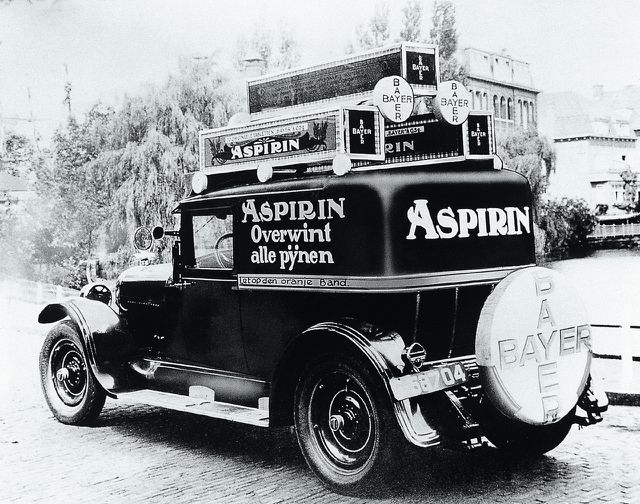
Aspirin has various side effects and drug interactions. For these reasons, there are several things you should watch out for when taking aspirin and only use the drug in an emergency.
Aspirin contains the active ingredient Acetylsalicylic acid (short ASS) and is sold by Bayer. There are now a number of aspirin supplements that are supposed to help against pain. In this health guide, we mainly refer to the active ingredient acetylsalicylic acid.
Aspirin: side effects of the pain pill

(Photo: Bayer AG / Press)
Aspirin works in three different ways:
- fever lowering
- pain reliever
- anti-inflammatory
There are numerous in the official package insert Side effects of aspirin called (PDF):
- Bleeding: nosebleeds, bleeding gums, red spots under the skin
- allergic reactions: skin rash, asthma attack or swelling of the face, and difficulty breathing
- Headache, dizziness, hearing loss, ringing in the ears (tinnitus)
- Cerebral hemorrhage
- stomach pain
- Gastrointestinal bleeding
- Increase in liver enzymes and liver dysfunction
- Hives (urticaria)
- Reye’s syndrome (decreased consciousness, abnormal behavior, or vomiting)
The side effects can occur if there is an intolerance to acetylsalicylic acid or an overdose.
Important: We recommend that you only take aspirin after consulting a doctor. If you notice any side effects, please contact your doctor. If you have severe side effects, do not hesitate to call the emergency services on 112.
Caution with aspirin: when is it useful and when not?



(Photo: CC0 / Pixabay / sweetlouise)
The simple aspirin tablets work for mild and moderate pain and fever, writes Stiftung Warentest. But the consumer experts warn:
- Since aspirin also delays blood clotting, it should not be taken before an operation. If you have an unplanned operation, you should definitely let the doctor know when you have taken aspirin.
- Children under the age of twelve with a viral disease should not take aspirin.
Aspirin direct According to Stiftung Warentest, it is only recommended with restrictions. This is a chewable tablet that is swallowed with water. However, if you do not chew the tablets small enough and drink too little water with them, you must expect parts of it to get stuck in the esophagus. This leads to undesirable side effects in the stomach and esophagus. Aspirin EFFECT is better suited.
Aspirin Complex should help with colds, but Stiftung Warentest advises against it. The drug is not put together in a meaningful way and normal aspirin helps just as well with pain and fever. If you have a cold, it should be better for a short time nasal decongestant spray use.
You should definitely not take aspirin under the following conditions:
- You have had a stomach or duodenal ulcer.
- Anyone who has ever been treated with salicylates or NSAIDs and subsequently noticed an asthma attack or allergic reaction should avoid aspirin. Similar side effects are to be expected here.
- If you are taking anticoagulant medication or are prone to bleeding, you should not take aspirin.
- If you have untreated heart failure, kidney or liver damage, you should speak to your doctor beforehand. This also applies to asthma, Nasal polyps and Allergies.
Interactions of aspirin with other drugs
Aspirin should be avoided in various combinations with other drugs. Interactions can occur when you take aspirin and over the same period:
- Anti-inflammatory drugs, NSAIDs
- means containing cortisone
- Methotrexate
- Valproic acid
- antihypertensive agents
- Serotonin
- Acetazolamide
- Benzbromaron and probenecide
- Phenprocoumon, warfarin, clopidogrel, prasugrel, and ticlopidine
- Sulphonylurea tablets and insulin.
Important: You should not drink alcohol before or after taking aspirin. It increases unwanted side effects on the stomach.
Risk groups: aspirin for pregnant women, breastfeeding women and children



(Photo: CC0 / Pixabay / jarmoluk)
- children: Children under the age of 12 should generally not take aspirin. There is a risk that the active ingredient could trigger Reye’s syndrome. Serious brain damage and liver malfunction can result.
- Pregnant & breastfeeding women: Stiftung Warentest recommends that pregnant and breastfeeding women avoid aspirin and take paracetamol or ibuprofen.
- People over 60 years: Older people should use lower doses of aspirin, as the active ingredient is only slowly excreted. A remedy with less impact on the stomach is also more advisable here.
Read more at Utopia:
- Dispose of medication: residual waste, collection point or pharmacy?
- What to do if you have diarrhea Effective home remedies instead of medication
- Öko-Test: clinical thermometers almost always reliable